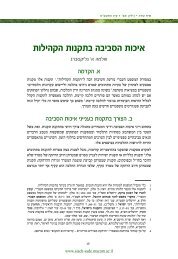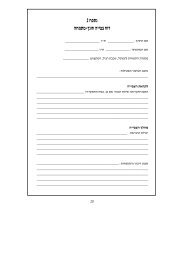ע - מכללת ליפשיץ - Macam
ע - מכללת ליפשיץ - Macam
ע - מכללת ליפשיץ - Macam
You also want an ePaper? Increase the reach of your titles
YUMPU automatically turns print PDFs into web optimized ePapers that Google loves.
IX<br />
Abstracts<br />
meticulous observance of the mitzvot by all, together with the<br />
concentration on the holiness of the Torah and the support of those<br />
who devote their lives to its study and dissemination. This was the<br />
way of true Judaism in the past, and is something that is contrary to<br />
the ethos of the Zionists, whether religious or not-religious, who<br />
seek to replace this with a new form of Jewish life. In this manner,<br />
Rabbi Soloveitchik created a fascinating synthesis between a<br />
desired social system that sees itself as perpetuating the traditional<br />
way of life and its educational values, but in fact transforms itself<br />
in its insistence to resist any required change or concession to<br />
modernity.<br />
In doing so, the meaning of the term "tradition" has been<br />
changed. In the past the plain meaning of "tradition" referred<br />
simply to the conservation of practices and customs that were<br />
established in the past. In Rabbi Soloveitchik theory, the term<br />
"tradition" is now used to mean his own practices or those of the<br />
present-day haredim, without the wish or need to check whether<br />
these were in fact practiced in the historical past.<br />
Yisrael Rozenson<br />
“And Here Is This Primary Doubt”:<br />
Rav Avraham Moshe Vitkind – Religious Zionist Thought<br />
and Educational Philosophy in Light of the Revolutions<br />
in the First Third of the 20 th Century<br />
Rav Avraham Moshe Vitkind (1882–1941), a congregational rabbi<br />
in a rural community in Lithuania (Botraminch), was educated in a<br />
Lithuanian yeshiva. His work was not widely known in the<br />
religious world in general and specifically in the Zionist religious<br />
camp. Although four of his books entitled “Tofaot Re’em” were<br />
fairly widely known, his philosophy and teachings have not been
















